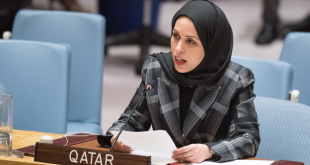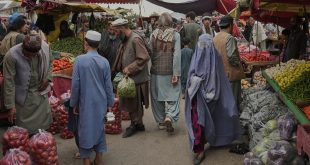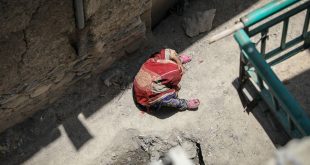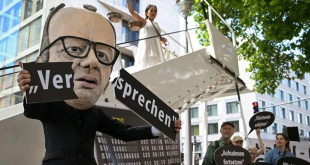AT News
KABUL: The US envoy to the United Nations has emphasized that the only way forward to peace in Afghanistan was meaningful talks with the participation of women and acceptance of an inclusive and elected government based on human rights values.
At a UN Security Council meeting in New York on Friday, representatives of UN member states expressed concern about the escalating violence, the escalation of Taliban attacks and civilian casualties in Afghanistan, and called on the Taliban to take the road to peace and stop their hostilities.
“The situation in Afghanistan has entered a dangerous phase,”’ said Debra Lyons, the UN special envoy for Afghanistan.
She added that war is raging and that human rights abuses and violence have multiplied. She stressed that the international community can now work together to prevent “a very serious catastrophe.”
He said the war had reached a deadly stage in recent weeks, with the Taliban launching heavy attacks on several major cities, killing more than 100 civilians in Helmand province alone since July 28. The escalation of violence has also led to food shortages for many and displaced thousands.
“Afghanistan could face the fate of Syria,” she warned.
The UN envoy said at least 460 civilians had been killed in Kandahar province in the past month alone, and that a total of more than 1,000 civilians had been killed in ongoing violence in the past month.
She warned that if not addressed, Afghanistan could face the fate of Syria, adding that 18.5 million people (about half the population) are in need of humanitarian assistance while attacks on aid workers continue.
This is as Zaranj, the capital of Nimroz province, fell to the Taliban on Friday.
And the Taliban assassinated the head of the Afghan government’s media center. And Street-to-street clashes continue in Lashkargah city and civilians are trapped.
She added that members of the international community had interacted with the Taliban as people who were supposed to make peace, and that after the signing of the US-Taliban memorandum, violence was expected to be prevented, but failed. To reduce the violence, which did not happen, after the withdrawal of almost all foreign troops from Afghanistan, the war was expected to end, but this was not seen.
Lyons called on the UN Security Council not to renew sanctions if the Taliban continued their violence and made no progress in peace. She cited reports of Taliban killings of civilians. The UN envoy to Afghanistan said that due to the current situation, legal and illegal migration from Afghanistan may double this year.
Ghulam Mohammad Ishaqozi, Afghanistan’s permanent representative to the United Nations, also called the Taliban’s attacks on several Afghan cities “cruel”, and said millions of people were at risk of being displaced.
“It is true that the Taliban have changed, but this change has been negative, they have become more cruel, vindictive and bloodthirsty,” he said.
He accused Pakistan of equipping and supporting the Taliban, saying the Taliban were not acting alone and that the group was also linked to international terrorism. But he said Afghanistan wanted a friendly relationship based on mutual respect with Pakistan.
The meeting was chaired by India and the representative of Pakistan was not present at the meeting.
Ishaqozi added that since mid-April this year, the Taliban “and their supporters of international terrorism” have carried out more than 500 attacks, with tens of thousands of foreign troops, including members of terrorist networks, accompanying them.
He added that the war in Afghanistan was not a civil war but a “war on international terrorism” and that the United Nations should take action to prevent the situation from deteriorating.
Shahrzad Akbar, head of the Afghan Human Rights Commission, also described the situation in the country as “urgent and miserable” and said that if no action was taken, more civilians would be killed. She expressed particular concern about the situation of women “who were victims of the Taliban yesterday and today.” He added that war crimes were being committed daily in Afghanistan, and that the Afghan Human Rights Commission had obtained evidence that the Taliban had killed at least 40 civilians in Kandahar’s Spin Boldak, confirming the incident. Akbar added that in addition to the daily horrors, all of Afghanistan’s human rights achievements in recent years are in jeopardy.
The British representative to the meeting said that if the Taliban came to power by force, the government would not recognize them. He also said that the country continues to support the Afghan government and government forces.
The British envoy added that he was working with his international partner, the Taliban
The US envoy also condemned the recent attacks in Afghanistan, saying the Taliban should hear from the international community that if they came to power by force, the government would not recognize them. He said the Taliban Islamic Emirate was unacceptable to the United States and the Taliban would be isolated.
She stressed that the only leading solution is a meaningful peace with the participation of women and the acceptance of the formation of an inclusive and elected government that adheres to human rights values.
The US and British envoys also noted the important role of Afghanistan’s neighbors in improving the situation.
Representatives of India, China, Russia, Norway, Mexico, Estonia, Niger, Vietnam and Ireland also spoke at the meeting, expressing their support for Afghanistan and emphasizing a peaceful solution in the country. The UN Security Council is expected to issue a statement following further talks.
 Afghanistan Times
Afghanistan Times



